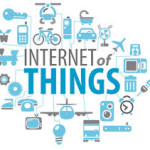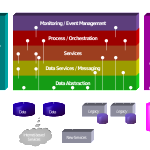Top 10 questions that can help discover the value of Internet of Things for any business
We have curated 10 questions that consultants and project managers can use to discover if an IoT project/application can help a business. Use these questions to start conversation with your existing clients or prospects to discover if IoT can add value to their business. The questions can also help you to determine the existing IoT Maturity Model stage of any business.
- How do you track the performance of manufacturing processes, and the impact of things like downtime, defects, etc.?
(Robin Mestre, Founder Principio Group)
Explanation: Machine downtime is a major concern in the manufacturing industry, especially for regional processing & resource intensive manufacturers who rely on economies of scale to earn profits ; use this question to dig deeper into a manufacturer’s machine maintenance issue.
- Have you already implemented SCADA, CIM, M2M, IT apps?
(Steve Jennis, SVP, Prism Tech. USA)
Explanation: Customers in manufacturing, power generation & fabrication industries may already be using SCADA (supervisory control and data acquisition) and M2M communication systems; these customers can benefit from IoT’s unified intelligent system that contain self-learning algorithms. These algorithms can self-identify trends that traditional ERPs or SCADA cannot. Early adopters are using SCADA, CIM & M2M data by directly transporting it to web-enabled ERP screens. The data sets are then published to all systems (production, asset management, Business Intelligence & analytics) that need this critical information to make decisions. IoT enables an ‘engineer-to-order’ manufacturing environment.
- Are you able to identify the supplier or manufacturing process issues?
(Rachel Lacy, Cloud One)
Explanation: This is a huge area of opportunity where companies can identify quality and compliance related issues by tracking material parameters of raw-materials and semi-finished goods right from the supplier’s warehouse. A crucial competitive advantage that can save the companies from costly warranty claims.
- Does your company track utilization of its high value assets?
(Muhammad Omer, Founding Partner, Allied Consultants)
Drill-down question: Do you have access to asset diagnostics?
Explanation: Companies that have a high dependence on their machines to generate revenues are interested in optimizing performance/ utilization of these machines. IoT can give significant insights into asset health, thereby allowing customers to improve asset reliability & availability.
- Does your company have real time asset tracking & asset diagnostics systems in place (based on sensors, actuators and RFIDs)?
Drill-down question: Do you manage a large workforce that performs on-field maintenance/installation tasks for clients?
- Do you have a closed loop product life-cycle management process?
(Rachel Lacy, Cloud One)
Explanation: IoT can add significant value for discrete manufacturers (automobiles, furniture, toys, smartphones, and airplanes). Historically, discrete manufacturers have lost control of their products once products leave factory floor. IoT can be used to track, manage and control product information throughout its product life-cycle.
- Does your company have deep visibility (location, point-to-point movement tracking, repair & maintenance data, humidity, heat, pressure, etc.) for all the key assets that matter?
Drill-down question: Does your company use real-time asset life/repair data to perform predictive maintenance?
Manufacturing companies have high-value machines that need periodic maintenance. Real-time+remote access to wear & tear records plus repair history can help them decide if the asset needs to be retired or replaced.
- Are your company’s assets secure, indoor & outdoor?
Drill-down question: Do you have 24/7 visual access to your remote/moving assets?
Explanation: Transport, logistics & insurance companies are especially interested in asset security. They have high-value moving & static assets such as trucks, containers, vehicle fleets and warehouses. Visibility and security of these assets can be improved through IoT.
- Does your product/service provide complementary web and mobile apps to differentiate products?
(Rachel Lacy, Cloud One)
Explanation: Manufacturing firms, field service companies, retail brands and insurance companies can move away from ‘price-alone competition’ by offering web and mobile applications that provide real-time services and information to clients using connected devices and platforms. Starbucks Coffee uses its mobile app to reward customers and track customer behavior in real-time.
- Do you have resource constrained devices in place (connected to internet) to track health and environment data of your workplace for worker safety?
Drill-down question: Does your company’s operating environment poses significant risk regarding worker safety?
Explanation: O&G, mining & manufacturing companies are especially interested in worker safety as their operating environment poses physical/ health risks to workers.
Which questions have you used to determine if IoT can add value to a business? Comment, share or tweet us @alliedco if you think that these are some of the smart questions to discover IoT’s potential value for a business/business function.






